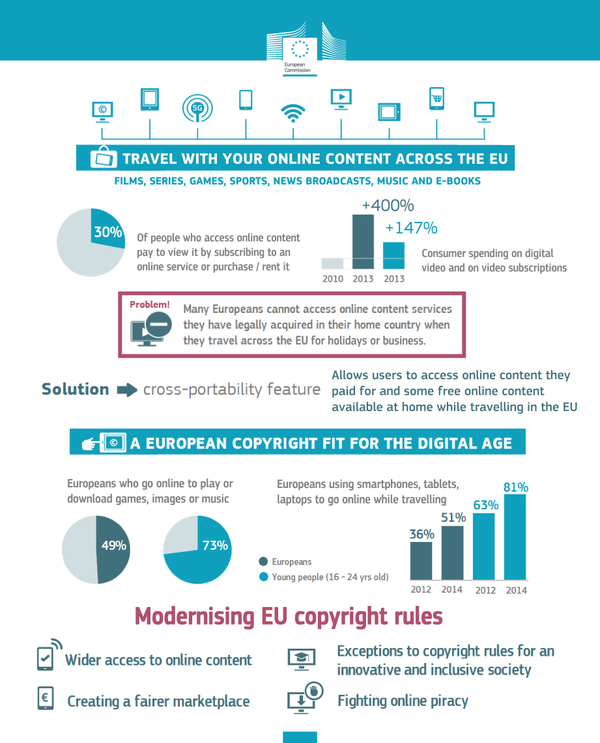The European Commission takes the first steps to broaden access to online content and outlines its vision to modernise EU copyright rules.
The proposed Regulation on the cross-border portability of online content services addresses these restrictions in order to allow EU residents to travel with the digital content they have purchased or subscribed to at home.
Cross-border portability, a new EU right for consumers, is expected to be a reality in 2017, the same year as the end of roaming charges in the EU (press release). Since it is a proposal for a Regulation, once adopted it will be directly applicable in all 28 EU Member States.
In addition, the Commission today outlines its vision of a modern EU copyright framework. This “political preview” will be translated into legislative proposals and policy initiatives in the next six months, taking into account all inputs from several public consultations.
Overall, the Commission wants to make sure that Europeans can access a wide legal offer of content, while ensuring that authors and other rights holders are better protected and fairly remunerated. The key sectors of education, culture, research and innovation will also benefit from a more modern and European framework.
Seven months ago, we promised fast delivery of the Digital Single Market. Today we present our first proposals. We want to ensure the portability of content across borders. People who legally buy content – films, books, football matches, TV series – must be able to carry it with them anywhere they go in Europe,” said Andrus Ansip, Vice-President for the Digital Single Market.
“This is a real change, similar to what we did to end roaming charges. Today, we also set out our vision for a modern copyright regime in the EU – and the gradual steps to achieve it. Our aim is to widen people’s access to cultural content online and support creators. We want to strengthen European R&D, using technologies like text and data mining. The Digital Single Market is the blueprint for Europe claiming its place in the digital era, today we start making it a reality”.
Günther H. Oettinger, Commissioner for the Digital Economy and Society, added: “The Regulation proposed today is the first step of an ambitious reform. I count on the co-legislators to make sure that portability becomes reality for European consumers by 2017 so that they can enjoy their favourite content also when they travel in the EU – and without the fear of roaming charges, which will end by mid-2017. Our action plan gives the direction for further reform in spring next year: we want a copyright environment that is stimulating, fair, rewards investment in creativity and makes it easier for Europeans to access and use content legally. Our ongoing work on the role of platforms and online intermediaries will also help to translate our plan into concrete proposals.”
